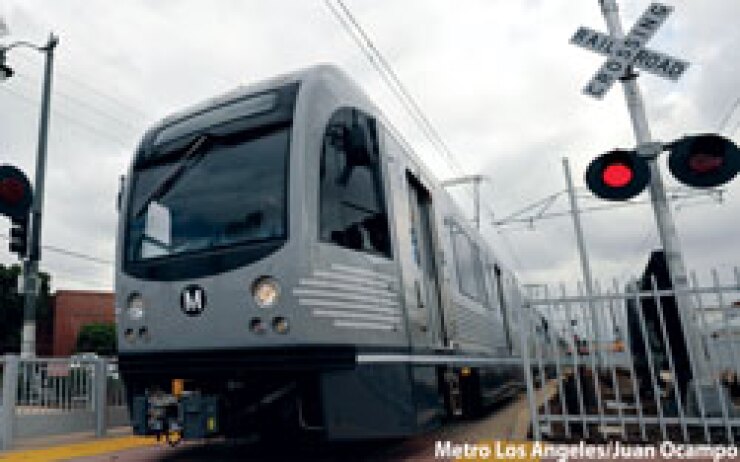

SAN FRANCISCO — Los Angeles Mayor Antonio Villaraigosa last week proposed borrowing to speed construction on $20 billion of mass transit projects approved by Los Angeles County voters last year.
The county’s voters last year approved Measure R, a half-cent, $40 billion sales tax increase championed by Villaraigosa to fund transit and road improvements over the next 30 years. Thirty-five percent of the funds were earmarked for new rail or bus rapid-transit capital projects.
The Los Angeles County Metropolitan Transportation Authority has been studying ways to phase construction of the projects. Villaraigosa, who is a member of the agency’s board, said he wants the work done as soon as possible.
“Thirty years is too long to wait when we can build all 12 projects in the next decade,” the mayor said in a speech Friday to the Los Angeles Business Council at the University of California Los Angeles.
He acknowledged that bringing the projects forward would create debt-service costs, but he argued that it would also cut construction costs by putting contracts out to bid while costs are lower. Villaraigosa’s plan, which he dubbed the “30/10” program, would create a half million jobs over the next decade, the mayor’s office said in a release.
It would also reduce pollution by getting Angelenos onto public transit sooner. The mayor’s office estimated that accelerating the projects would cut 1.8 times more carbon dioxide and 2.4 times more nitrous oxides from the air than the currently envisioned three-decade implementation.
“When we have workers hungry for high-quality jobs, companies that are ready to hire, the dirtiest air, and the worst traffic congestion in the nation, 30 years is just too long,” Villaraigosa said.
The mayor was the biggest backer of Measure R, which provides funding for a dozen major rail projects, including a subway to the Westside, the extension of the Gold Line in the San Gabriel Valley, extension of the Green Line to Los Angeles International Airport, and the extension of the Expo Line to Santa Monica, the long-dreamed of “Subway to the Sea.”
Measure R passed in November with the support of just over two-thirds of Los Angeles County voters.
Villaraigosa’s 30/10 proposal would have to be approved by the Metropolitan Transportation Authority’s 13-person board, which includes other Los Angeles County elected officials. After convincing them, Villaraigosa will have to lobby Congress and the Obama administration to speed federal funding to the projects.
The plan would raise about $5.2 billion over the next decade by borrowing against sales tax revenue. Another $10 billion would have to come from federal and local matching funds and private investments in the project. The agency already planned on getting about $6.8 billion in non-Measure R funding, primarily from state and U.S. transit funds.
“Because Measure R will provide approximately $13 billion for transit projects over the next 30 years, the MTA will have the ability to repay funds with guaranteed local sales tax revenues,” Villaraigosa’s statement said. “This unique local match capacity is expected to open opportunities for advancing the funding and paying it back over time.”





